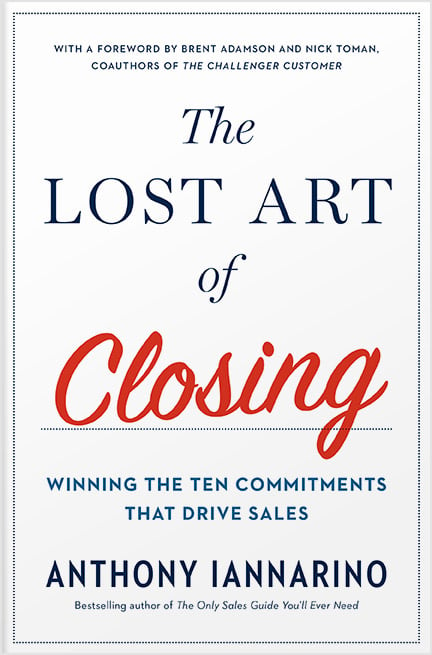The Gist:
- In any conversation with a prospective client, you may encounter an objection.
- While it’s important to know how to overcome objections and resolve your client’s concerns, it also important to forestall objections in the first place.
- One way to eliminate objections is to deal with the concern early in the conversation.
At any stage of the sales conversation, there is a possibility that your prospective client will offer you an “objection,” mostly around some commitment that you ask them to make. That commitment may be necessary to the conversation, their future decision, and the better outcomes they need—the same ones that caused them to engage with you in the first place. While it’s important to know how to handle those objections, another strategy is to forestall them, preventing them from occurring at all.
I’ve spent a lot of time and spilled a lot of (virtual) ink dealing with the objections your clients throw at you, both when you are prospecting and at the end of the sales conversation when you ask them to make a commitment. But if you really want to improve your ability to win big deals, learn to sell in a way that makes objections (and the concerns behind them) less likely to occur at all. The ability to control the process by negotiating the necessary commitments can help you forestall objections and concerns that might otherwise show up later.

A Theory of Objections
It is important to distinguish an objection from a concern, and to treat them differently. When a client “objects,” usually they are hiding a real concern, one they don’t want to share with you. The easiest way to understand this idea is by looking at a couple incredibly common objections and the well-recognized concerns they are hiding.
A client who answers your prospecting phone call, listens to your pitch for a meeting, and responds by saying something like “can you send me some information in an email” is offering you an objection. They have no real interest in anything you might send in response to their objection. Instead, they are being polite by not sharing their real concern: that a meeting would be a waste of their time.
On the other hand, when a client says “I am not sure that this is going to work for us the way we need it to,” you can be certain that this is a real concern, one that will torpedo your deal if you fail to resolve it. This same idea expressed as an objection might sound like “we need to think about this,” words that should cause you to recognize that your contact has some unspoken concern.

Spoiler Alert
One of the ways you forestall objections to a commitment for future meetings is to explain which conversations your client is going to need to have, why they are necessary to making a good decision, and how they will help them end up with the right solution, the right partner, and the consensus of the team of people who the change will affect.
By previewing the different conversations and clearly explaining why they are necessary—and how the client benefits from having them—you are positioning yourself as their Sherpa, a person focused on helping them with their buyer’s journey by guiding them over ground that you have covered far more often.
Even though you will still need to acquire a next meeting at the end of every call, by showing the decision-makers and decision-shapers the conversations they need to have with you—and with each other—you make it easier to gain those commitments because you already have a broad commitment to the process.
An ounce of prevention is worth a pound of cure. Start the conversation with a question like, “Can I share with you a plan to help ensure that you end up with the best solution, the best results, and your team’s commitment?”

Individual Objections and Concerns
Mapping out the conversation is helpful, but it doesn’t make you immune from objections and concerns at other stages of the conversation. You may have noticed that once in a blue moon, your clients fail to keep some of the commitments they make. You’ll always have to wrangle your contacts and work hard to help them do what is right: even when it is uncomfortable, and even when they would rather not have certain conversations at all.
One frequent concern about consensus, for example, takes the form of a contact insisting, “I will be the one making this decision, and everything is going to go through me.” If you have already done discovery and developed a solution, you have missed your opportunity to forestall this objection.
Any problem you have that happens more than once is one you should work to avoid by being proactive. So next time, in your first meeting with your contact, you can forestall that objection by saying something like “How important is that your team is committed to the change you are trying to make?” Or, perhaps, “One of the things you should expect from a partner is their willingness to understand what your team is going to need from a solution.”
The underlying concern here comes down to control, and it is rarely a good sign. To help make this easier and potentially forestall a future objection, say, “Would you be able to join us in meetings with the other people who are going to be part of this decision, and would you be willing to be our main contact?”
No matter how slick your CRM is, you have to understand human psychology to predict and forestall objections. Take the time to study why your clients object to commitments and how you can help them resolve their concerns—even when they try to hide them. You can solve these challenges with your head, your heart, and your gut.
Do Good Work:
- Make a list of the objections you encounter most often.
- Understand the concern behind each objection to better address your client’s concerns.
- Recognize the areas where an early conversation can eliminate objections that would otherwise crop up later.

Essential Reading!
Get my 2nd book: The Lost Art of Closing
"In The Lost Art of Closing, Anthony proves that the final commitment can actually be one of the easiest parts of the sales process—if you’ve set it up properly with other commitments that have to happen long before the close. The key is to lead customers through a series of necessary steps designed to prevent a purchase stall."
Buy Now










.jpg?width=768&height=994&name=salescall-planner-ebook-v3-1-cover%20(1).jpg)



Comments